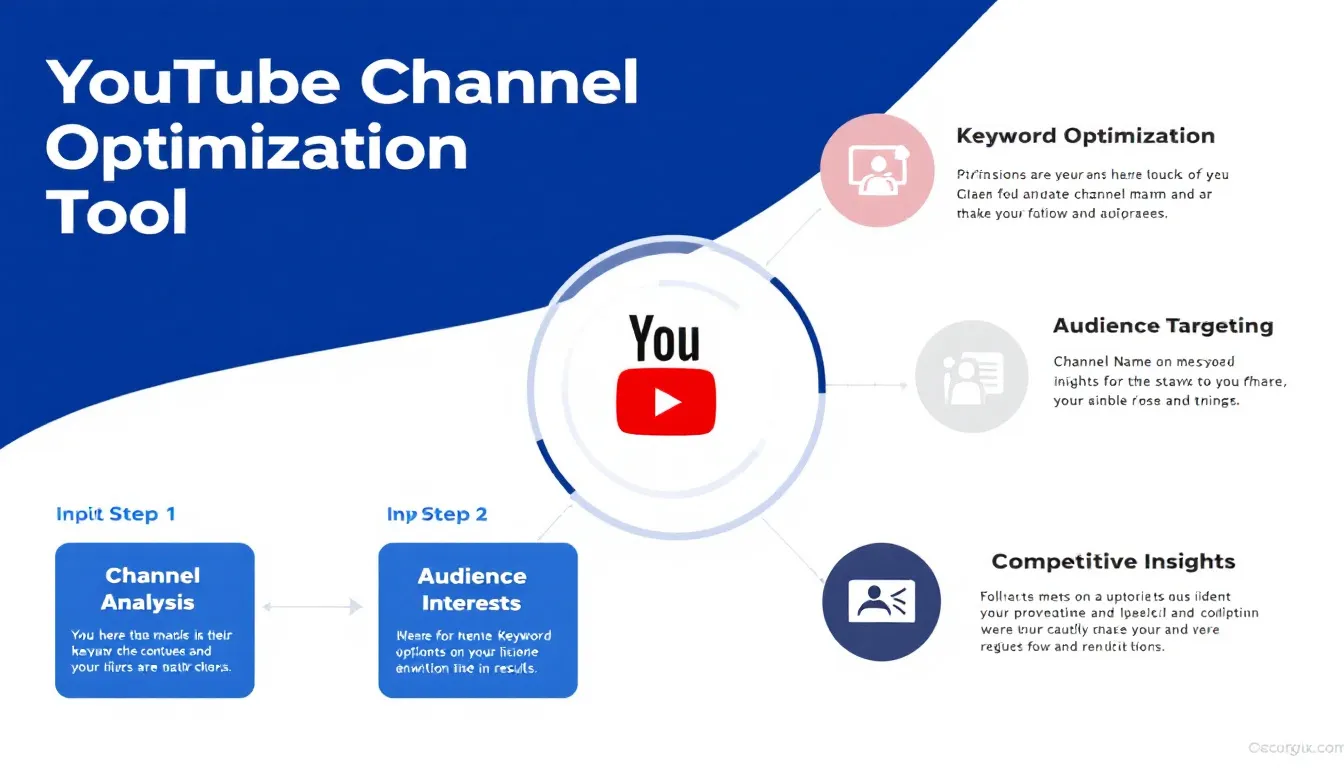Is this tool helpful?
How to Use the YouTube Channel Optimization Tool Effectively
1. Channel Name Input
Enter your YouTube channel name exactly as it appears to ensure accurate analysis. Examples:
- “Tech Explorers Hub”
- “Daily Gardening Tips”
2. Target Keywords
Add specific keywords you want to rank for, separating them with commas to give the tool clear focus areas. Examples:
- “urban gardening, container plants, sustainable gardening”
- “smart home devices, IoT tutorials, home automation setup”
3. Target Audience Interests
Describe what your viewers care about to align suggestions with their preferences. Examples:
- “Tech enthusiasts interested in DIY projects, gadget reviews, and software tips”
- “Beginner gardeners focusing on easy-care plants and indoor gardening”
Introducing the YouTube Channel Optimization Tool
This tool offers tailored SEO recommendations to help you improve your YouTube channel’s search rankings. By analyzing your channel name, target keywords, and audience interests, it delivers practical strategies to boost your visibility and attract more viewers.
Purpose of the Tool
It identifies keywords and content areas that resonate with your viewers, helping you tailor your videos for better discovery on YouTube and related search engines.
Key Benefits
- Customized keyword suggestions aligned with your channel’s niche.
- Content optimization tips that match your audience’s interests.
- Insights on competitor positioning for strategic growth.
- Guidance on SEO-friendly content structure to improve rankings.
Practical Use Cases for the YouTube Optimization Tool
Content Strategy Improvement
Use the tool to address key challenges in optimizing your YouTube channel:
- Find and implement relevant keywords your audience uses
- Optimize video titles and descriptions for better search visibility
- Refine audience targeting to increase viewer engagement
- Differentiating your content from competitors
Example Scenarios
Example 1: DIY Home Improvement Channel
Channel: “Handy Home Projects”
Topics: Woodworking tutorials, tool reviews, home repair tips
Audience: Enthusiasts aged 20-45 looking for practical DIY advice
Optimization Suggestions:
- Use long-tail keywords like “easy woodworking projects for beginners”
- Create video series focusing on seasonal home improvements
- Organize playlists by project type to improve content navigation
Example 2: Language Learning Channel
Channel: “Spanish Speak Easy”
Topics: Conversational Spanish, grammar lessons, cultural tips
Audience: Adult learners seeking practical language skills
Optimization Suggestions:
- Target niche keywords like “Spanish phrases for travelers”
- Produce content targeting different language proficiency levels
- Introduce themed challenges to engage learners consistently
Maximizing Results with Strategic Implementation
Plan Your Content Calendar
Leverage the tool’s keyword and topic suggestions to organize your content schedule by:
- Mapping out video themes quarters ahead
- Taking advantage of seasonal keyword trends
- Creating cohesive video series to build audience retention
Enhance Audience Engagement
Apply the tool’s insights to improve viewer interaction by:
- Optimizing titles and descriptions for clarity and appeal
- Designing thumbnails that attract clicks
- Including effective calls-to-action that encourage subscriptions and comments
Frequently Asked Questions
Q: How often should I use the tool?
Use it monthly to keep up with evolving keywords and audience interests.
Q: Can new channels benefit from this tool?
Yes, it helps new channels establish effective SEO practices from the start.
Q: What should I prioritize in the recommendations?
Focus first on keyword implementation, then refine content structure and audience targeting.
Q: Will the tool help increase video engagement?
Absolutely. Aligning content with viewer interests increases watch time and interaction.
Q: Does the tool consider seasonal trends?
Yes, it factors in seasonal search patterns to help you plan timely content.
Q: Can I optimize multiple channels using this tool?
Yes, submit each channel separately to get tailored SEO suggestions for every niche.
Best Practices for Ongoing Optimization
Regularly Review and Update
- Track your channel’s performance after each optimization
- Adjust strategies based on measurable results
- Experiment to find what resonates best with your audience
Maintain Content Quality While Optimizing
- Prioritize valuable, engaging content alongside SEO efforts
- Balance trending keywords with evergreen topics
- Focus on keeping your audience’s needs front and center
Important Disclaimer
The calculations, results, and content provided by our tools are not guaranteed to be accurate, complete, or reliable. Users are responsible for verifying and interpreting the results. Our content and tools may contain errors, biases, or inconsistencies. Do not enter personal data, sensitive information, or personally identifiable information in our web forms or tools. Such data entry violates our terms of service and may result in unauthorized disclosure to third parties. We reserve the right to save inputs and outputs from our tools for the purposes of error debugging, bias identification, and performance improvement. External companies providing AI models used in our tools may also save and process data in accordance with their own policies. By using our tools, you consent to this data collection and processing. We reserve the right to limit the usage of our tools based on current usability factors.







